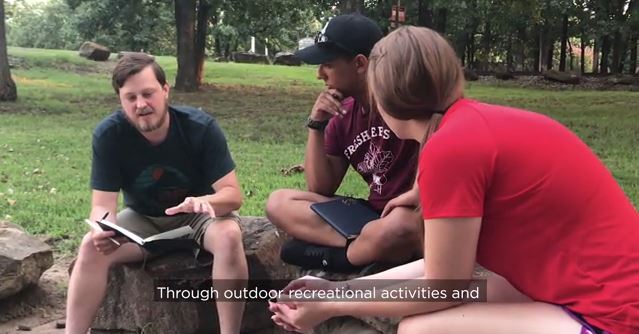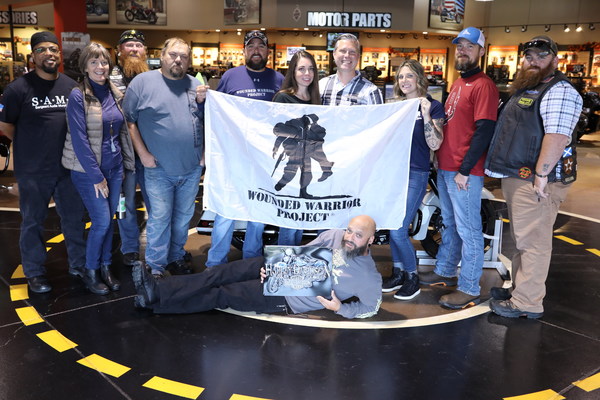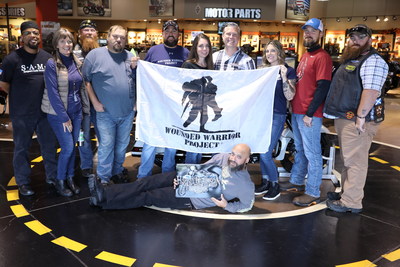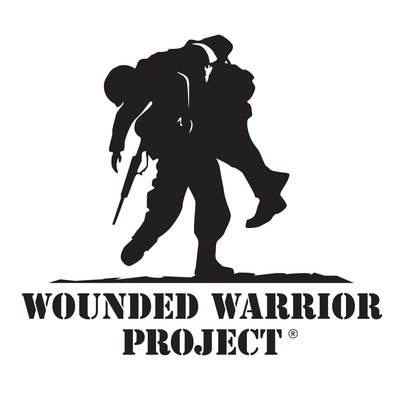Wounded Warrior Project and Harley-Davidson Join Forces to Help Empower Veterans Through Rolling Project Odyssey
JACKSONVILLE, Fla., March 3, 2020 /PRNewswire/ -- Wounded Warrior Project® (WWP) and Harley-Davidson Motor Company® are again hitting the road to bring Rolling Project Odyssey® to wounded veterans.
Rolling Project Odyssey is a unique motorcycle group riding experience that aims to support veterans in their recoveries from invisible wounds of war. First partnering with WWP on the experience in 2015, Harley-Davidson is sponsoring additional group rides to extend the program to more veterans across the United States.
"We are grateful for Harley-Davidson's support and honored to partner with such a legendary brand as we fuel the future of Rolling Project Odyssey," said Lt. Col. (Ret.) Michael Richardson, WWP vice president of independence services and mental health. "Our goal is to focus warriors on their present to enable the growth of their future. The overall Rolling Project Odyssey experience is designed to encourage warriors to face adversities of the past and accomplish goals together with peers facing similar challenges, just as they did on the battlefield."
One of WWP's marquee mental health programs for veterans, Project Odyssey helps warriors manage post-traumatic stress disorder (PTSD), traumatic brain injury (TBI), and other combat stress through adventure-based learning that encourages a connection with fellow veterans and nature. In Rolling Project Odyssey, motorcycle riding becomes the catalyst for the program to provide mental health education, which aims to:
- Help warriors manage their invisible wounds.
- Teach them how to enhance their resiliency skills.
- Empower them to live productive and fulfilling lives.
"Rolling Project Odyssey was a life-changing experience for me," said Jonathan Goolsby, an Army veteran who attended a previous Rolling Project Odyssey in Georgia. "The experience has taught me many things that I have been able to implement into my daily life, like finding my center and keeping my cool when things start to get tough."
Warriors at Project Odyssey enjoy the camaraderie of engaging with their fellow veterans who have similar interests and experiences. Activities like motorcycle riding and socializing with other veterans provide an opportunity for warriors to connect and expand their support network. In a WWP survey of the wounded warriors it serves, warriors expressed they address their mental health concerns by talking to fellow veterans (41%) and physical activity (30%). A review by the U.S. Department of Veterans Affairs notes that "veterans with better social support have more positive mental health outcomes, including lower rates of suicidal ideation."i
Through Rolling Project Odyssey, veterans also experience the joys of motorcycle riding. A 2019 neurobiological study conducted by a team of three researchers at UCLA's Semel Institute for Neuroscience and Human Behavior and funded by Harley-Davidson concluded that:
- Riding a motorcycle decreased hormonal biomarkers of stress by 28%.ii
- Sensory focus was enhanced while riding a motorcycle versus driving a car, an effect also observed in experienced meditators vs non-meditators.iii iv v vi
- Changes in study participants' brain activity while riding suggested an increase in alertness similar to drinking a cup of coffee.vii viii ix x xi xii
"Supporting the military is ingrained in our brand's 117-year legacy, and we take pride in working with organizations such as Wounded Warrior Project so together we can positively impact the lives of those who served," said Jon Bekefy, general manager of brand marketing at Harley-Davidson Motor Company. "We support the goals of Rolling Project Odyssey and are excited to share with our country's service men and women the joys of motorcycle riding and the attributes that are synonymous with two wheels – community, support, and personal freedom."
The first Rolling Project Odyssey of 2020 will take place March 9 -13. The journey will start and finish in Jacksonville, Florida, where WWP headquarters are located, and feature a stop in Daytona for Bike Week, which kicks off riding season in the U.S. each year. Learn more about WWP's Project Odyssey program.
About Wounded Warrior Project
Since 2003, Wounded Warrior Project® (WWP) has been meeting the growing needs of warriors, their families, and caregivers – helping them achieve their highest ambition. Learn more.
iAdams, R. E., T. G. Urosevich, S. N. Hoffman, et al. 2017. Social support, help-seeking, and mental health outcomes among veterans in non-VA facilities: results from the Veterans' Health Study. Military Behavioral Health 5, no. 4:393–405.
iiAs measured by the concentration ratio of DHEA-S to cortisol
iiiAs measured by the mismatch negativity (MMN) – the change in the amplitude of evoked auditory responses, to standard versus deviant tones
ivBiedermann, B. et al. Meditation and auditory attention: An ERP study of meditators and non-meditators. Int. J. Psychophysiol. 109, 63–70 (2016).
vSrinivasan, N. & Baijal, S. Concentrative meditation enhances preattentive processing: a mismatch negativity study. Neuroreport 18, 1709–1712 (2007).
viLuo, Y., Wei, J. & Weekes, B. Effects of musical meditation training on auditory mismatch negativity and P300 in normal children. Chin. Med. Sci. J. 14, 75–79 (1999).
viiAs measured by the commensurate reduction in alpha frequency band power between baseline and riding to caffeine vs placebo
viiiBarry, R. J. et al. Caffeine effects on resting-state arousal. Clin. Neurophysiol. 116, 2693–2700 (2005).
ixDimpfel, W., Schober, F. & Spüler, M. The influence of caffeine on human EEG under resting condition and during mental loads. Clin. Investig. 71, 197–207 (1993).
xAngelakis, E., Lubar, J. F., Stathopoulou, S. & Kounios, J. Peak alpha frequency: an electroencephalographic measure of cognitive preparedness. Clin. Neurophysiol. 115, 887–897 (2004).
xiReeves, R. R., Struve, F. A., Patrick, G. & Bullen, J. A. Topographic quantitative EEG measures of alpha and theta power changes during caffeine withdrawal: preliminary findings from normal subjects. Clin. Electroencephalogr. 26, 154–162 (1995).
xiiKaplan, G. B. et al. Dose-dependent pharmacokinetics and psychomotor effects of caffeine in humans. J. Clin. Pharmacol. 37, 693–703 (1997).
SOURCE Wounded Warrior Project




